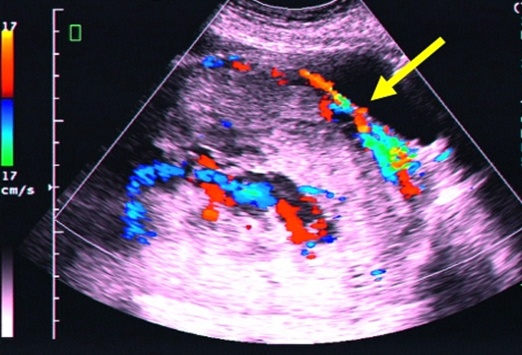What Is A Doppler Scan?
A Doppler Ultrasound in pregnancy should not be confused with the typical ultrasound scan that most women have more than once during their pregnancy. The typical ultrasound will allow you a first glimpse of your unborn baby and possibly tell you the sex, while the Doppler measures the flow of blood around the body of your unborn baby and shows if enough oxygen and nutrients are reaching the unborn baby through the placenta.
A Doppler Ultrasound in pregnancy is conducted in the same way as an ultrasound scan and in fact the same equipment is used as the majority of scanners have the Doppler function on them. During the scan you will have to lie down on a table with your belly exposed and the technician will rub gel onto your tummy before then moving a device called a transducer, over your tummy. This will send sound waves which bounce off the flow of blood to the body of your unborn baby along with their blood circulation system. The technician is then able to read the screen and see how the blood is flowing and this gives an indication of how well the baby is doing. The Doppler ultrasound in pregnancy will add on just a few minutes to your regular ultrasound and the technician will advise you of the results there and then.
Are Doppler Scans Safe?
Providing the Doppler ultrasound scan is carried out in the hands of a technician who has been trained they are considered to be just as safe as a typical ultrasound scan and it should not pose any risk to the unborn baby when carried out during the 2nd and 3rd trimester. If you are at all worried about any part of the ultrasound scan or the Doppler scan you should talk with a medical professional or the technician beforehand.
Why You Might Need A Doppler Scan
There may be numerous reasons why your Doctor may ask you to have a Doppler ultrasound in pregnancy. Reasons typically include:
You are a smoker. You had a miscarriage late in a previous pregnancy or lost a baby during birth. You suffer from a high or low BMI, aka body mass index. You have had a baby that was underweight. You are having more than one baby, twins, triplets, for example. Your baby doesn’t seem to be growing at a rate that is considered healthy. Your baby has been diagnosed with slapped cheek disease, aka parvovirus.
What Does The Doppler Scan Look For and Why?
The Doppler ultrasound scan in pregnancy is undertaken so that the doctor can check if everything is going to plan to allow your baby to develop healthily. Depending on your situation the sonographer, the person doing your scan, will check over different areas. Typically such a scan is only offered to women if their doctor has any concerns about the baby and pregnancy.
There are different scans and these generally include
Uterine artery Doppler scan – Checks the uterine arteries, which are the vessels that take blood to the uterus, aka womb. This is to check that there is enough blood going to the placenta. Umbilical artery Doppler scan – This is to check the rhesus antibodies if your baby seems to be growing at a slow rate. It is to check the umbilical cord as the blood flows from the placenta.
Should I Use A Doppler At Home?
Just as with a typical ultrasound machine, there is a portable Doppler machine that you can purchase or hire for use within the home. Typically this is used for the parents to listen in to the heartbeat of their unborn baby. Generally the majority of midwives and doctors will advise against the use of one at home. Of course the machine can give the mother to be and partner great peace of mind by listening to the heartbeat of the baby. However there are some downsides and these include:
Finding the heartbeat is not always easy and this can cause undue stress and worry in the event you cannot find the heartbeat. A common mistake can also be made with the machine at home and this is that you can pick up the sound of blood going through the placenta and think this is the sound of the heartbeat. A more sound and reliable way to get peace of mind if you are worried is to contact your midwife instead of trying to find the heartbeat of your baby at home.
What Is a Cardiotocograph?
There is another type of Doppler ultrasound in pregnancy that can be used and this is the Cardiotocograph. While it may have a fancy unpronounceable name, it simply monitors the heartbeat of the baby to make sure that the heart is beating normally. It doesn’t produce an image, it only uses sound. If the pregnancy is going as normal and there is no cause for concern then you probably won’t have the CTG. This type of scan is not typically used until after the 13th week as earlier than this and there is a lot of difficulty in finding the heartbeat.
How Is A CTG Used During Labor?
The CTG can come into its own during labor, where it is typically called electronic fetal monitoring, aka EFM. Here its typical use is in monitoring the contractions along with the heartbeat of your unborn baby. However if all has gone well with the pregnancy this type of monitoring may not be used as there are other ways that are less invasive to monitor mother and baby. The CTG may however be used when you are first admitted onto the ward in labor, typically for around 30 minutes, with the readings being used as a base if it is needed at a later stage in the labor. Featured photo credit: Flickr via flickr.com

